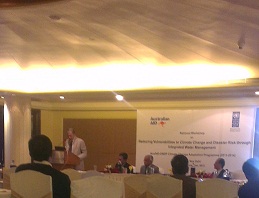/topics/conservation-reducing-water-usage
Conservation - Reducing Water Usage
Hindustan Unilever Vitality Foundation invites proposals on thinking and action on the theme of 'water for public good' - Apply by January 31, 2013
Posted on 08 Jan, 2013 02:41 PMAbout Hindustan Unilever Vitality Foundation
Hindustan Unilever Vitality Foundation has been set up as a not-for-profit entity by Hindustan Unilever Limited with the intent to make a difference in the domain of water, specifically to further “water for public good” in India. In the first phase of the programme, the primary deliverable was to create significant water conservation potential. To this end, HUVF has partnered with reputed NGOs, pursuing projects in more than 150 villages across India.
In the second phase of the programme, HUVF wishes to support NGO partners who along with communities can proactively contribute to systemic and policy level change at the macro-level using the experiences and learnings from the micro-level projects, while furthering their execution.
Accordingly, the key deliverables in the second phase of the programme, would be interpreting and delivering on certain “Principles of water” through micro-action and contributions arising from these actions to leading to systemic and policy change on water, apart from benefits from water conservation and the allied micro-level project impacts. Considering the water nexus with the social landscape, environment and food security, a mix of actions, in different ecosystems and in a diverse socio-economic milieu would be needed.
Survey of the environment 2012 - A publication by The Hindu
Posted on 31 Dec, 2012 09:59 AMThe report includes the following articles under separate sections:
Biodiversity
The section on biodiversity includes four articles:

A growing concern - How soon will India run out of water - Paper published in the Journal of Global Health
Posted on 29 Dec, 2012 05:33 PMThe paper informs that groundwater accounts for about 50%-80% of domestic water use and 45%-50% of the irrigation in the country.
Briefing papers on ‘Jal kothis’, ‘Matka filter’, 'Dug wells' and ‘Phayedemand shauchalaya’: Local innovative solutions in flood prone Bihar by Megh Pyne Abhiyan (2011)
Posted on 29 Dec, 2012 03:14 PMThe briefing papers include the following:

Conservation across landscapes: A study of the various mechanisms of biodiversity conservation in India
Posted on 28 Dec, 2012 02:38 PMChapter 1: Background
Biodiversity conservation has normally followed one of two approaches-

What we must do to save the rivers of Maharashtra - A seminar cum panel discussion, National Womens Organization, Pune, January 30, 2013
Posted on 28 Dec, 2012 10:43 AMOrganizers
National Womens Organization and Gandhi National Memorial Society
Venue
Gandhi National Memorial,
Agakhan Palace, Nagar Road, Pune - 411006
Objective
South India left with water storage level lowest in a decade - Roundup of the week's news (December 17 – 23, 2012)
Posted on 24 Dec, 2012 06:41 PMSouth India left with water storage level lowest in a decade






